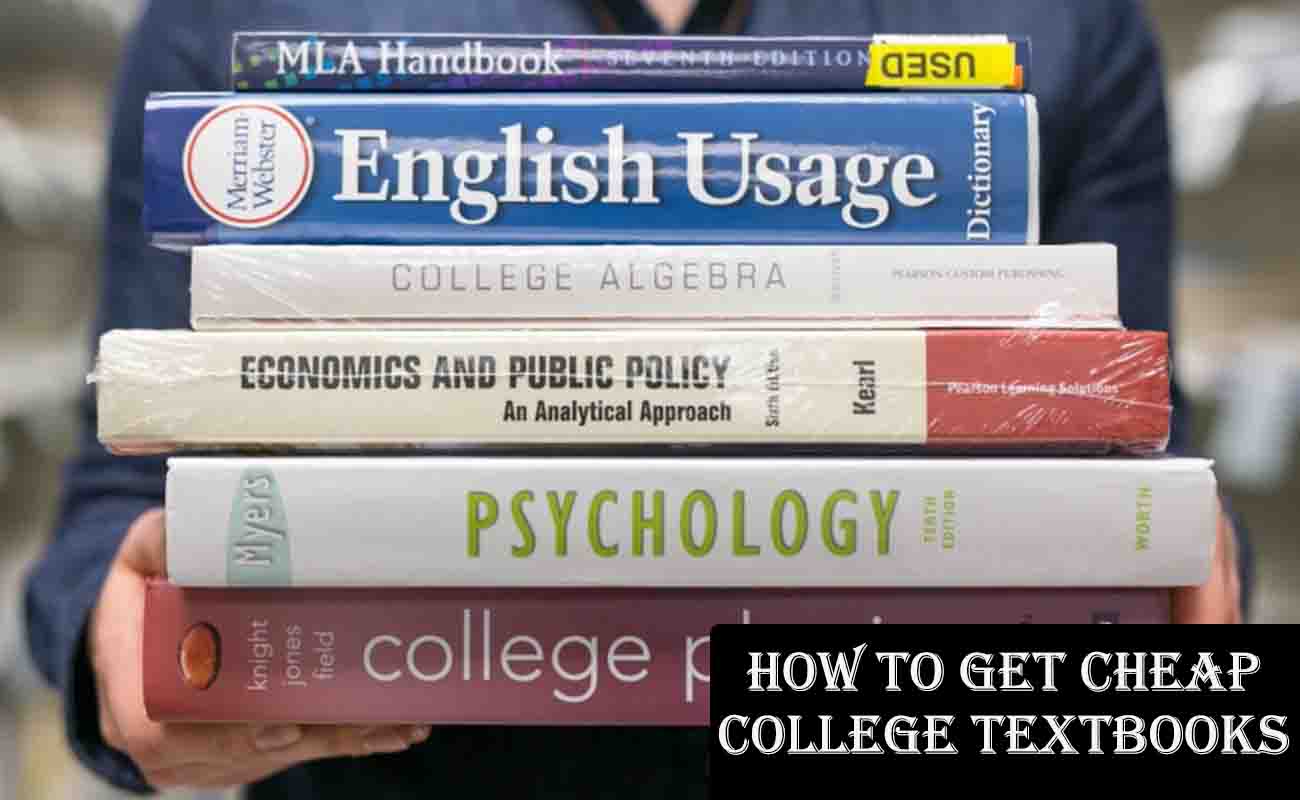I will share tips on how to Get Cheap College Textbooks. As a college student, I know firsthand how expensive textbooks can be, often eating up a huge chunk of your budget before the semester even starts. Finding ways to get cheap college textbooks has been a game-changer for me.

I’m excited to share practical, real-world tips to help you save money while still getting the resources you need to succeed in your classes. Textbooks are a non-negotiable part of college life, but their skyrocketing prices can feel like a punch to the wallet.
With a bit of strategy and resourcefulness, you can cut those costs significantly. In this article, I’ll walk you through my tried-and-true methods for scoring affordable textbooks, from renting to exploring digital options and leveraging campus resources. Let’s dive into how you can keep more cash in your pocket without sacrificing your studies.
How to Get Cheap College Textbooks
The first step to getting cheap college textbooks is understanding your options. When I started college, I was shocked to see single books priced at $200 or more at the campus bookstore. But after some trial and error, I learned there are smarter ways to go. Here’s how you can start:
- Check Your Syllabus Early: Professors often list required and recommended texts in the syllabus. I always download mine as soon as it’s available to see what I need. Sometimes, “recommended” books aren’t essential, so you can skip them or borrow them later if needed.
- Talk to Your Professor: I’ve found that some professors are flexible about editions or even okay with you using older versions of a textbook. Send a quick email or visit office hours to ask if you can use a previous edition, which is often much cheaper.
- Compare Prices Online: Don’t just settle for the campus bookstore. I use sites like BookFinder or Chegg to compare prices across multiple retailers. This small step can save you hundreds of dollars over a semester.
By planning and doing a little research, you’re already on your way to cutting textbook costs.
Renting Textbooks: A Budget-Friendly Option
Renting textbooks has been a lifesaver for me, and it’s a great way for you to save money. Instead of buying a book you might only use for one semester, renting lets you borrow it for a fraction of the cost. Here’s how I approach it:
- Where to Rent: Sites like Amazon, Chegg, and CampusBookRentals offer rentals at steep discounts compared to buying new. For example, I rented a $150 chemistry textbook for $30 for the semester. Most sites let you highlight or take notes in the books, but check the rental terms to avoid fees.
- Campus Library Rentals: Some college libraries offer textbook rentals or short-term loans. I was surprised to find my university library had a reserve section where I could borrow textbooks for a few hours or even a semester at no cost.
- Return on Time: One thing I’ve learned the hard way is to mark return dates on your calendar. Late returns can lead to fees, so stay organized.
Renting is perfect if you don’t need to keep the book long-term, and it’s one of the easiest ways to get cheap college textbooks without committing to a full purchase.
Buying Used Textbooks
Buying used textbooks is another strategy I swear by. There’s something satisfying about snagging a book for half the price—or less—just because it has a few dog-eared pages. Here’s how you can make this work:
- Online Marketplaces: Sites like eBay, ThriftBooks, and AbeBooks are goldmines for used books. I once found a $120 math textbook for $15 on eBay. Just make sure the edition matches what your professor requires.
- Student-to-Student Sales: Check campus bulletin boards, student Facebook groups, or apps like BookScouter for deals from other students. I’ve bought books directly from seniors who no longer need them, often at a steep discount.
- Inspect Before Buying: When buying used, check for missing pages or excessive highlighting. I learned this after getting a book that was practically unreadable due to neon marker scribbles.
Used books are a fantastic way to save, especially if you’re okay with a little wear and tear.
Exploring Digital Textbooks and E-Readers
Digital textbooks have become my go-to in recent years, and they can be a budget-friendly option for you too. E-books are often cheaper than physical copies, and they’re easier to carry around. Here’s what I’ve learned:
- Where to Find E-Textbooks: Platforms like VitalSource, Google Play Books, and Amazon Kindle offer digital versions of textbooks, often at 30-50% less than print editions. I’ve also found free or low-cost PDFs on sites like OpenStax for general education courses.
- Subscription Services: Services like Cengage Unlimited or Pearson+ give you access to multiple e-textbooks for a flat fee. I subscribed to Cengage for $120 a semester and got all my course materials, saving me over $300 compared to buying individually.
- Device Compatibility: Make sure your e-reader or laptop supports the format. I use a tablet with a stylus to annotate my e-textbooks, which feels almost like writing in a physical book.
Digital options are convenient and cost-effective, especially if you’re comfortable reading on a screen.
Leveraging Campus and Community Resources
Your campus and local community can be treasure troves for cheap college textbooks. I’ve been amazed at the resources right under my nose that I initially overlooked. Here’s what you can try:
- Library Reserves: As mentioned earlier, many libraries keep textbooks on reserve. I’ve used this for expensive books I only needed for specific assignments.
- Textbook Exchange Programs: Some schools have student-run textbook exchanges. My university’s student government organizes a swap event each semester, where I’ve scored books for free or at a low cost.
- Local Bookstores: Independent bookstores near campus sometimes offer used textbooks at better prices than the university bookstore. I found a literature anthology for $10 at a local shop, compared to $80 at the campus store.
Don’t underestimate the power of asking around—your campus community might have more options than you think.
Open Educational Resources (OER)
One of my favorite discoveries has been Open Educational Resources (OER), which are free or low-cost educational materials. These have saved me hundreds of dollars, and they’re worth checking out:
- What Are OERs?: OERs are openly licensed textbooks and course materials, often available as PDFs or online. Sites like OpenStax, MERLOT, and OER Commons have high-quality options for subjects like math, science, and history.
- How to Find Them: I start by searching my course subject on these platforms. For example, I found a free biology textbook on OpenStax that my professor approved as a substitute for the $200 required text.
- Talk to Your Professor: Not all professors know about OERs, so I always ask if they’re okay with me using one. Most are happy to help you save money.
OERs are a fantastic way to get cheap college textbooks—sometimes even for free!
Timing Your Purchases Strategically
Timing is everything when it comes to getting cheap college textbooks. I’ve learned that when and where you buy can make a huge difference in price. Here’s how you can play the timing game:
- Buy Early: Prices tend to be lower before the semester starts when demand is still ramping up. I check my syllabus in the summer and start hunting for deals then.
- Wait for Sales: Some retailers, like Amazon or Chegg, offer back-to-school discounts. I’ve scored books at 20-30% off by waiting for these sales.
- End-of-Semester Deals: If you’re planning for the next semester, check for deals at the end of the current one. Students often sell their books cheap to clear them out.
Being strategic about when you buy can shave significant dollars off your textbook costs.
Financial Aid and Textbook Vouchers
If you’re on financial aid, you might have access to resources to help cover textbook costs. I didn’t know about these until my second year, and they made a big difference:
- Check with Your Financial Aid Office: Some schools offer textbook vouchers or grants for students on financial aid. I got a $200 voucher one semester, which covered most of my books.
- Scholarships for Textbooks: Look for scholarships specifically for course materials. My community college had a small fund for low-income students, and I applied for $100 toward my books.
- Work-Study Programs: If you have a work-study job, ask if you can use some of your earnings for textbooks. I used part of my work-study paycheck to cover a book I couldn’t find cheap elsewhere.
These options require a bit of legwork, but they can ease the financial burden significantly.
Selling Your Textbooks After the Semester
Once the semester’s over, I always try to sell my textbooks to recoup some of my costs. This can help you fund your next semester’s books. Here’s how I do it:
- Sell Online: Platforms like BookScouter, Amazon, or Chegg let you sell used textbooks. I sold a $100 book for $40, which was enough to cover a rental for the next semester.
- Campus Buyback Programs: Some campus bookstores offer buyback programs, though they often pay less than online platforms. Compare offers to get the best deal.
- Keep Books in Good Condition: I’m careful not to over-highlight or damage my books, as this increases their resale value.
Selling your books is like recycling your investment, putting money back in your pocket for future expenses.
FAQs About Getting Cheap College Textbooks
Q: Can I use older editions of textbooks to save money?
A: In many cases, yes! I always check with my professor first, as older editions are often much cheaper but may have slight differences. Most of the time, the core content is similar enough to work.
Q: Are digital textbooks worth it?
A: For me, they are. They’re usually cheaper, portable, and easy to search. However, if you prefer physical books or struggle with screen fatigue, you might want to stick to print options.
Q: How do I know if a textbook is required or just recommended?
A: Check your syllabus or ask your professor. I’ve saved money by skipping “recommended” books that weren’t essential for assignments or exams.
Q: What if I can’t afford any textbooks?
A: Look into library reserves, OERs, or financial aid options. I’ve also shared books with classmates or borrowed them for short periods to get by.
Q: Is renting better than buying used?
A: It depends. Renting is great for short-term use, but buying used can be cheaper if you plan to sell the book later. I compare both options to see which saves more.
Conclusion
Finding ways to get cheap college textbooks has been a journey of trial and error for me, but it’s worth the effort to keep your budget intact. By exploring rentals, used books, digital options, campus resources, and OERs, you can drastically cut your textbook expenses.
Timing your purchases and selling books afterward can further stretch your dollars. With these strategies, I’ve saved hundreds each semester, and I’m confident you can too. Stay resourceful, ask questions, and don’t be afraid to think outside the box—your wallet will thank you!

